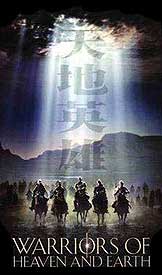 China's western frontier looks a lot like the American west in the serious-minded epic Tian di ying xiong or Warriors of Heaven & Earth (2002), with the Chinese being the cowboys & the Turks being the Indians, who even go "woo-woo-woo" when they ride their horses round & round a Chinese encampment. China's western frontier looks a lot like the American west in the serious-minded epic Tian di ying xiong or Warriors of Heaven & Earth (2002), with the Chinese being the cowboys & the Turks being the Indians, who even go "woo-woo-woo" when they ride their horses round & round a Chinese encampment.
The enormity of the Chinese vistas, captured by superb cinematography, is alone proof that this planet earth is far more amazing than any made-up computer-FX vision of the world. The gorgeous armor & costumes & conflicts of the Middle Kingdom era are thrilling to see.
There seemed to be a lot more John Ford than John Woo in this one, which was mostly a good thing.
It might've been a five-star gem, but the romanticized realism of the thing falls all apart at the end when Buddhist supernaturalism provides a rushed deux ex machina climax.
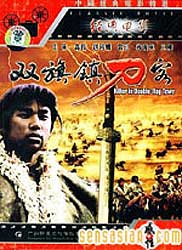 Ping He's first film The Swordsman in Double-flag Town (Shang-Qi-Zhen daoke, 1991) is a total masterpiece that swept film festival awards around the world. Ping He's first film The Swordsman in Double-flag Town (Shang-Qi-Zhen daoke, 1991) is a total masterpiece that swept film festival awards around the world.
This film has often compared to John Ford, just as Kurosawa was recurringly compared to Ford. He's also been compared to Sergio Leone.
Although the comparisons are obvious & largely accurate, nevertheless, I must say it's a little unfair to assume a western style for any Asian filmmaker who jettisons the comic book standards of wuxia period films in favor of harsh, gorgeous realism; & prefers character actors to glamorous guys & dolls.
Of course, wuxia fans attracted to the down-market cartoonish elements will be bored by such truer, finer work, but that still doesn't mean it's a western.
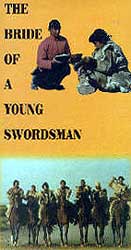 When capturing something that is extremely real & internationally comprehensible, it's way too tempting to grab credit & assume the high quality is the influence of western filmmakers. When capturing something that is extremely real & internationally comprehensible, it's way too tempting to grab credit & assume the high quality is the influence of western filmmakers.
But real is real & the influences east & west among the grittiest & best filmmakers is bound naturally to share a lot of common ground.
A mainland film, the wide open spaces of the Gobi are not images ever seen in Hong Kong or Taiwan productions, which are lucky to find park environments without skyscrapers showing on every horizon.
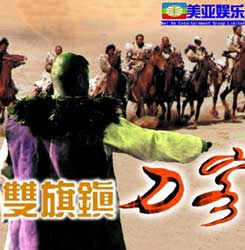 The visual beauty of the cinematography of Ma Lin in capturing the doomful expanses is alone worth the viewing. The visual beauty of the cinematography of Ma Lin in capturing the doomful expanses is alone worth the viewing.
All the more winningly, there's also a suspenseful story to be told, fine characterization, & when it gets down to the action, a degree of realism to the swordplay all too rare in wuxia or swordplay films that all too often prefer flying superheroes over credible historical adventure.
A young man (Gao Wei) arrives in walled Double Flag Town where dwells Haomei (Mana Zhao) his bride-to-be.
His intent is merely to take her to his own village. Her father sizes up the young man & decides he's hardly more than a child, & so doesn't have to honor the arranged marriage.
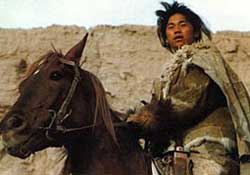 Ruffians additionally figure they can do with the kid anything they want & there's nothing he can do about it. In reality, despite his boyish youth, he's very skilled at twin-swords fighting. Ruffians additionally figure they can do with the kid anything they want & there's nothing he can do about it. In reality, despite his boyish youth, he's very skilled at twin-swords fighting.
When his bride is threatened with rape, our hero kills the rapist. But the dead man had a brother who will certaainly track him down for revenge. That man is known far & wide as Lethal Swordsman, having never come within a li of defeat.
The film is mainly a pictorial waiting game for that inevitable duel. The circling in windy dusty desert town is more important than the final clash which, like a gunfight, is quickly decided when at last engaged. I was left stunned & overawed, as there hasn't been a Chinese action director of this quality since the death of King Hu. And Ping He may well be even better.
copyright © by Paghat the Ratgirl
|
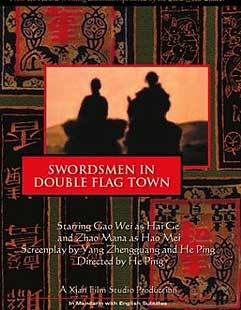


 When capturing something that is extremely real & internationally comprehensible, it's way too tempting to grab credit & assume the high quality is the influence of western filmmakers.
When capturing something that is extremely real & internationally comprehensible, it's way too tempting to grab credit & assume the high quality is the influence of western filmmakers. The visual beauty of the cinematography of Ma Lin in capturing the doomful expanses is alone worth the viewing.
The visual beauty of the cinematography of Ma Lin in capturing the doomful expanses is alone worth the viewing. Ruffians additionally figure they can do with the kid anything they want & there's nothing he can do about it. In reality, despite his boyish youth, he's very skilled at twin-swords fighting.
Ruffians additionally figure they can do with the kid anything they want & there's nothing he can do about it. In reality, despite his boyish youth, he's very skilled at twin-swords fighting.